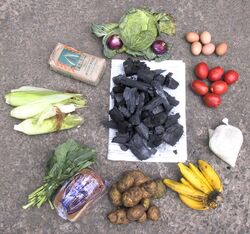|
Last edited: 13 September 2019
|
Conventional cookstoves require significant economic investment to operate. This not only includes the direct costs if fuel is purchased, but also more intangible time costs if fuel needs to be gathered—a difficult task often left to women and girls.
The problem[]
Cost of fuel[]

In Nairobi, Kenya each group of food items shown here costs the same as the quantity of charcoal shown in the center.
Although the task of gathering fuel presents its own economic challenges, purchasing fuel carries more direct economic implications. Purchasing fuel leaves families with fewer resources to be spent on food and other essential items.[1]
Lack of time for income generation[]
For families without access to readily available and inexpensive cooking fuel, gathering biomass fuel such as wood, dried plants, and even animal droppings, is frequently the only available option to acquire the fuel necessary to cook meals. Strict gender roles often leaves this responsibility to women and girls. It can take hours to complete and as such, leaves women and girls with little or no time to participate in other activities, including ones which would allow them to generate income to support themselves and their families. [2]
Lack of time for education[]
When girls are saddled with the burden of gathering fuel to cook their families’ meals, they are prevented from one of the most important parts of childhood—education. By needing to spend their days gathering fuel, they are left out of the classroom.[2] The effects of this are compounded as these girls grow up, as a lack of access to education has been shown repeatedly to negatively impact an individual’s future personal and professional opportunities.
A solution[]
Solar ovens do not require their fuel to be gathered or purchased and as such, provide several economic benefits to users:
- Reduces costs: By reducing or eliminating a family’s need to purchase cooking fuel, solar ovens provide families with the ability to allocate resources that would have otherwise been used to purchase cooking fuel.
- Income generation: By not needing to tend to cooking fires, women and girls have the opportunity to pursue income-generating activities, including building solar cookers and selling solar-cooked food!
- Education: As solar ovens only require energy from the sun to power, girls do not need to spend time gathering fuel, giving them time to pursue an education.
See also[]
- The Analysis of the Economic Impacts of Solar Cooking - Solar Cookers International
- Environmental benefits of solar cooking
- Health benefits of solar cooking
- Cultural variables
- Fuelwood
- Solar food processing
- Solar restaurants and bakeries
